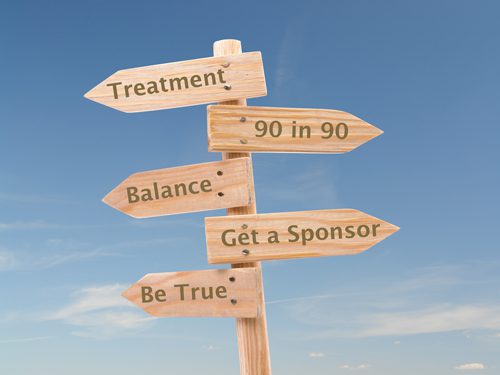 Making the decision to go into a drug treatment facility is life-changing.
Making the decision to go into a drug treatment facility is life-changing.
The first few days in treatment can feel alien and scary. As the mind and body begin to heal and as you make new friends, it becomes easier to fall into the daily routine of treatment. After detox and treatment comes the next step: leaving the safe haven of the facility and transitioning back into life. While completing treatment was a huge achievement, going home can feel even more frightening than when you first entered rehab.
The risk of relapse is high in the beginning of recovery. Early in my sobriety I would hear people at twelve-step meetings say that it was a gift that they were there. Others would introduce themselves as a ‘grateful recovering addict.’ I would mumble to myself, “Yeah, some gift, sitting here in a meeting.” At the time, I did not fully comprehend what a gift sobriety is, nor could I be grateful that I had to sit through meetings. In time, it became clear that sobriety really is a gift of a better life. I watched people come in and out of the rooms. I watched people go back out and never return. The addiction relapse rate is high, about 40-60 percent.
Although relapse is a part of many people’s story, it does not have to be a part of yours. Having the right mindset and following some simple practices and goals can help prevent relapse in the first year.
- Make a clear decision. Making the decision not to use alcohol or drugs under any circumstance is a good first step toward life-long sobriety. Many people get stuck in the thought that because addiction is a disease, they are helpless. But willpower still plays a role in recovery. Exercising your willpower every day will strengthen it for the challenging times.
- Make 90 in 90. While having the will to stay clean goes a long way, doing it alone can take a toll. Loneliness is a risk factor for relapse. Upon returning home, find meetings in your area. Make a commitment to make 90 meetings in 90 days. If a meeting does not suit you, find a different one. Going to a meeting every day for the first three months helps to build a new network of people who will be there to support you.
- Get a sponsor. Sponsorship in sobriety is important. Keep your eyes and heart open to find a sponsor. Don’t be afraid to ask someone to sponsor you. Even a temporary sponsor is better than no one. When I was newly sober, my sponsor was a life saver. When I asked her to sponsor me, she agreed to be a temporary sponsor. We are still going strong almost a decade later. In my toughest early days, I did not pick up because I did not want to disappoint her or risk losing my new friendship. A sponsor will hold you accountable and help you through the steps when you are ready.
- Balance – Finding balance in life may be more difficult than it sounds. Addiction is chaotic. People suffering from addiction may let responsibilities pile up high and use drugs or alcohol as a way to escape the stress. Some people are people-pleasers, not comfortable saying ‘no’. Whatever your personal circumstances were that brought you into addiction, the bottom line is that your life was out of balance. In sobriety, finding balance will bring peace and contentment. Sometimes in early sobriety, it’s easy to get stuck in trying to make up for lost time at work or with family. Be mindful of substituting one addiction for another. It may be easy to fall into an excess of work, sex, food, or exercise as a substitution for drugs or alcohol. Getting the right balance of sleep, food, work, alone time, and social time is the key to contentment.
- To thine own self be true. Honesty is the lifeline of maintaining sobriety, beginning with the self. Lying to ourselves about our addiction is often what kept us stuck in it. Learning to be true to yourself, in all endeavors, will bring peace into your life. Be honest with yourself about what you can and cannot handle. Be honest with yourself in your friendships or personal relationships, and do not be afraid to tell people how you feel (with grace and dignity, of course). Keeping emotions bottled up is often what led to addiction to begin with.
Keeping an open mind in early recovery and listening to suggestions from those who have long-term sobriety are two more keys to unlocking a new, beautiful life!



